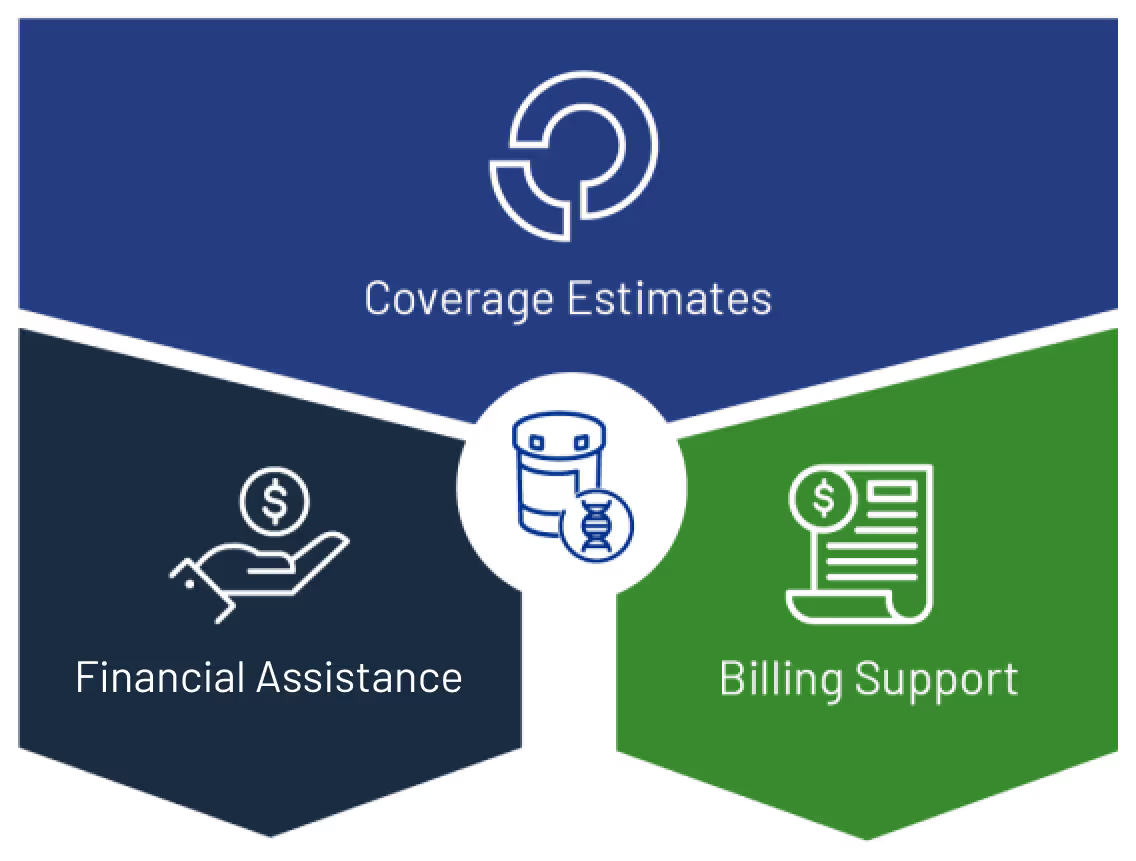Coverage Estimates
As a first step, we recommend contacting your insurance plan to discuss the test and their coverage policies. We also recommend contacting the Providence Price Transparency team to obtain an estimated cost for genomic testing.

Although advanced genomic testing might not be helpful for everyone, for many types of cancer it could provide useful information that might affect your treatment options. If your doctor has recommended genomic testing many Medicare plans and private insurance plans approve payment for advanced cancer testing like this. However, if you don’t have Medicare coverage or the test was denied by your insurance, we offer resources, support and financial assistance to help.
Each cell within your body contains a set of instructions for life, your DNA. Genomic changes (called mutations) in the tumor can impact how your cells grow and divide, resulting in cancer. Some cancers can be traced to your family history or to the environment, but most cancers occur without any identifiable cause due to a random accumulation of gene mutations. The good news is that many cancers can now be treated with therapies that target specific mutations. We can identify these mutations through genomic testing. Identifying specific biomarker/gene mutations can assist you and your doctor with developing a personalized care plan.
Dealing with unexpected medical costs can feel overwhelming, especially when managing your journey through cancer. Providence is committed to price transparency and to helping you understand potential costs before making a testing decision.
If your doctor has recommended genomic testing please take a moment to learn more about the potential costs. As a mission-driven organization, Providence believes patients should have access to important healthcare options and provides resources and support to help.

As a first step, we recommend contacting your insurance plan to discuss the test and their coverage policies. We also recommend contacting the Providence Price Transparency team to obtain an estimated cost for genomic testing.
Providence offers financial assistance to qualifying patients who have out-of-pocket costs associated with Providence genomic testing. Financial assistance is based onneed and can be applied for at any point during the testing process.
Financial Assistance:
Mon. to Fri., 8 am – 5:30 pm PT
We have assembled a variety of resources to help with healthcare billing.
Your Providence paper billing statement will state: “Your Visit to Providence Portland Medical Center.” While this may be confusing for patients outside of Oregon, this is the location of the Providence Molecular Genomics Laboratory that your tumor tissue was sent for testing. Your bill will identify this as the Providence location where you received care.
You can make this request online:
View and Pay BillContact the Providence Business Office
If you have more questions or concerns about ProvSeq-Solid Tumor testing
please contact your physician.
We imagine a healthcare system where each patient’s journey is deeply informed by their whole-person context, including genomic, clinical, social, and protective risk factors.
If a patient develops cancer, our GenACT precision oncology program provides Comprehensive Genomic Profiling (CGP) tests to diagnose genetic anomalies in the tumor for targeted therapy.
Through pharmacogenomics (PGx) testing, we use genomics to understand how an individual’s genes affect their response to medication.
This comprehensive risk assessment is integrated into routine medical care to help us use genetics to identify potential hereditary cancer risks and recommend proactive, personalized care plans.
“Genomics is leading a big change in patient care, making personalized treatments possible and reshaping medicine. It’s paving the way for a future where treatments are tailored to each person.”
